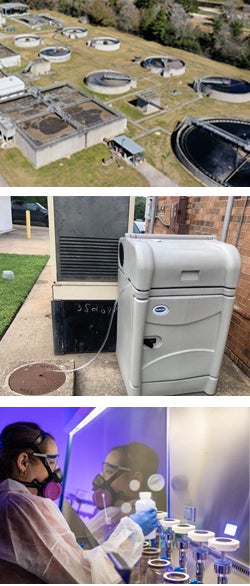
Houston is the fourth most populous city in the nation, with one of the largest separate sewer systems. The city owns and operates 39 wastewater treatment plants and a comprehensive collection system, serving over two million people. The system encompasses over 6,000 miles of sewer lines, 390 lift stations, and more than 120,000 manholes.
Since May 2020, the Houston Wastewater Epidemiology team has been collecting and analyzing 24-hour time-weighted samples from city-owned wastewater treatment plants on a weekly basis. The team also collects weekly samples from facility-level locations, such as manhole locations that serve schools, homeless shelters, the jail, nursing homes, and lift stations.
Samples are analyzed at two laboratories: the Stadler Laboratory at Rice University and the Houston Health Department Laboratory. The concentration of targeted pathogens is determined in each sample using a process that includes concentration, extraction and purification of nucleic acids, and quantification of genes.
The Stadler Laboratory regularly designs, tests, and maintains molecular assays that support ongoing surveillance efforts. The lab’s Public Assay Directory offers technical information on assay development, validation, and optimization for targets of interest.
